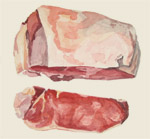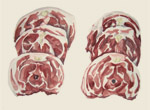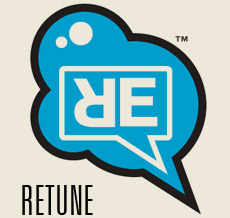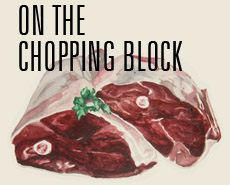On the Chopping Block
by EMILY NEMENS
Cicero arrives early each morning. In the first weeks of summer the hour is light enough to cast long shadows of firemen’s plugs down the sidewalk, in the winters the sky is a murky pink-black, a mauve the closest to pitch the city can offer.
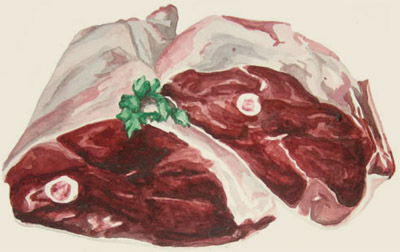
All watercolors by Emily Nemens
This morning is closer to the former than the latter, and Cicero stops his truck in the red-curbed fire lane. With his tail-lights left blinking, he tumbles out of the vehicle’s high cab. Cross the walk he knocks on the butcher’s window, peering into its ascetic insides. Banks of neon tubes cast white light, white tiles bounce it back, and the bright room hums through its cold windows. With another rap the butcher is at the door, unlocking the glass-paned door and propping it open.
The pair walks around the truck, negotiating slick stones coated with the morning’s gray mix of black grit and the street-washer’s suds. Behind the vehicle, this slime is tinted by the steady red drip from the truck’s belly. The driver throws up his back gate, and the two climb aboard. Flanks are embraced like old friends, hoisted a few inches up by Cicero, just enough so that the butcher — not as thick as his companion but taller by six inches — can loosen the hooks from their loads. Cicero lets go, the mens’ legs clear, and the carcasses thud like so many heavyweights hitting saw-dusted mats. The reverberations of each tome’s fall carry up to their teeth, to their jowls and into their sinuses, sensitive from a morning chill that lingers into May. Selections made, Cicero squats and jumps off the truck’s four-foot elevation, waiting for the butcher to spin the heavy end of a slab into his waiting hands. The butcher starts for a flank, but pauses for the sake of a vision from the corner of his eye. He turns, bringing the scene into focus: the island’s midtown towers are still slate and navy, the blue sky behind passing through white-gold.
Then the two carry the day’s ration inside, straight past the tiled front and into a refrigerated room with stainless freezers, concrete floors, behind. Another embrace, a hoist, and the sides are affixed to the butcher’s hooks, volumes waiting to be dissected. The butcher sees Cicero to the door. With a rumble and wave, Cicero starts his engine and continues to his next delivery, a grocery in Hell’s Kitchen.
The butcher sets to work on his stack. He cleaves, into halves and halves again, parsing quarters into cylinders and then slices, steaks. From the storefront hooks he hangs his first carcasses like so many hocks, the more enticing, bright-red passages dangling close to the front’s stenciled plate glass. The deli case he fills with pieces too large for their platters; they will be retrieved and refashioned into thin volumes through the day’s progress. He slides the cooler’s door closed, washes his hands and steps out onto the sidewalk, wiping his wet palms on his apron. It is impeccably bleached save for a cluster of pink rosettes along his lowest left rib.
Outside there are men in white shirts and black ties swarming around unopened umbrellas. The dusty warm air between them and the butcher mutes the clatter of silverware being laid on glass café-style tabletops. A string of passing trucks blast exhaust, banging over places the bricks have gone sunken and missing. Lithe women stalk down the sidewalk, tottering to cross the uneven street before they reach his blood-soaked station. The butcher walks towards the river. He buys himself a coffee at the corner stand, milk, no sugar, and makes his way back to the store. Inside he flips a sign, open, to the street, the bold-lettered closed watches his return.
In the back, the butcher slices another sizable steak, about the length of his arm, and as wide. The larger portion — a side bigger than his trunk — remains in the refrigerator, where it will wait to be felled in page-long extracts. He lays today’s serving on the cutting board and begins his work, slice by slice. After an hour he tires of its rote, and slides a platter of excised passages into the glassed display, next to yesterday’s sestinas, an aged salami, a French shank bone.
The first customers arrive around ten, a few, efficient women who will roast and stew all afternoon. He greets them by their husbands’ fathers’ names, which they find agreeable. While he wraps their orders, they admire a lean, lovely poem that has caught the midmorning light, or comment favorably on the Calvino in the corner of the picture window. It is a few days past prime but holding its age well.
Between matrons he works behind the counter, settling into the day’s course of revisions. Inflection, the skin, is almost always stripped away before the animals reach him. The epidermal layers — and accompanying feathers and fur — being at once unnecessary and defining, are sent to other venues: the creaking tanneries across the Hudson, the taxidermist upstate, the furrier in Queens. But without them, the butcher can only imagine what the creatures looked like, how they sounded while still unmolested, cawing to a crowd of brethren. Sometimes, as in the case of chickens, she is not skinned so much as plucked. The characteristic feathers, her intonations, removed, the carcass arrives as a splayed Bacon-esque gathering of dimples. He lines these up in the bottom-chilled glass case like so many titles in a publisher’s line.
His audience, he knows, is a group of readers that prefers a leaner serving, and often times a language’s nuance is fat from which they would like to be spared. Some pieces start well cut, but others are thick with excess. With an hour before lunch, he begins with the trimming. Many pieces of fat can be pulled off easily — unnecessary articles slip away under the thumb’s slight pressure — but others are less pliable, requiring the ease of a slender, sharp knife to trace the sinew down and around the animal’s thigh, under its arm, along its back. In the rational, mid-morning light, he finds a chunk that looks particularly grotesque. From this he cuts away with quick, clean swipes, impulsive decisions that eliminate clauses, change adjectives and the curve of its musculature. He trims away overly verbose flourishes as he does the white knots of marbled meat, leaving just enough for the buyer to see the mastery of their absence.
Lunch comes, followed by the afternoon maids running vacant-eyed errands. One comes for Mrs. Linley, just back from Paris and demanding something scrawled across the back of a receipt. The woman cannot pronounce the desired French for the butcher, but passes the note over his counter. Hungry-eyed graduate students come in after their 2 pm lecture, looking at everything before settling for the thinnest slice of a most luxurious essay. Between customers he reexamines his wares, and some of his initial work, literal and even-handed, appears now vulgar. In such instances, he reenters the flesh with a slighter hand than the morning’s early blows, easing around the contours of a stanza. A few businessmen come in late afternoon, three-piece suits open with the heat of the long-blocked walk over from the Eight Avenue Line. These men have their favorites, tried and true. The butcher pulls out their slabs before the door’s hinges ease closed. I’ve got a good piece for you today, he says with a smile.
No one who enters the shop questions the quality of his work. If they had wanted the authentic animal, they would not have come to him: they would have acquired a small tract of mountain in northern Spain, lured their own squadron of black-footed pigs with handfuls of acorns, and waited for the fruits. Had they wanted veracity in their experience, they would have gone to south central France and the Limousin steed’s rocky terrain rather than purchasing his variety, a more vibrant, manufactured red than the Lascaux caves declare. Had they wanted to see the living animal, they would have visited a far away farm, where a man worked, unawares of an audience except for the consumption that comes implicit with birth, knives, and the truck that rumbles off heavy once a month.
There, on that farm, was their author; the butcher on West 13th remained their translator. And he fills their every requests: thinly-sliced Serrano, Cervantes, parcels wrapped in crisp white paper of clear English, packages of Flaubert, his French filets slender enough to slip into one’s bag or tuck under one’s arm. The butcher’s servings are a pleasure, easy to carry home, to prepare, to discuss over dinner. As such, he does a good business.
At seven, once the last dinners have been sold, the butcher gathers up the day’s graying scraps with the bones and blood, the muck of a busy Thursday. These go, along with the blood-soaked pages of foreign dictionaries, into heavy plastic bags. He deposits them on the sidewalk’s edge, tied tight and waiting for the evening collection. Then he washes his knives, wipes the counters, and mops the floors. He tidies his stacks, selecting a slim volume for himself, and retreats to the upstairs apartment for a meal and a few hours’ rest.

